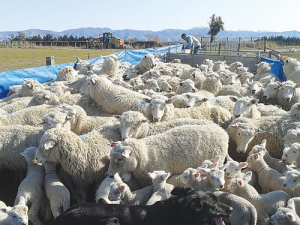Getting sheep shape at Pyramid Farm
The vineyards at Pyramid Farm in Marlborough’s Avon Valley have never been run of the mill, with plantings that follow the natural contours of the land, 250 metres above sea level.
 Australian research has found that a calm temperament in ewes improves both ovulation rate and more successful pregnancies.
Australian research has found that a calm temperament in ewes improves both ovulation rate and more successful pregnancies.
A calm temperament in ewes improves ovulation rate and successful pregnancies, according to a study published by The University of Western Australia (UWA).
The study involved researchers from Uruguay, Australia’s Department of Primary Industries, Regional Development WA and the university.
They investigated the reproductive outcomes of 200 Merino ewes known to have either a calm or a nervous temperament. They found the ovulation rate and rate of successful pregnancies to be higher in the calm ewes.
Associate professor Dominique Blache from UWA’s School of Agriculture and Environment and Institute of Agriculture who led the study said temperament affects ovulation rate but not the occurrence of ovulation.
“Differences in reproductive outcomes between the calm and nervous ewes were mainly due to a higher ovulation rate in calm ewes,” she said.
“Even when the ovulation rate is maintained, some of the nervous ewes have problems in maintaining their pregnancy possibly because of the quality of the eggs and subsequent embryos, and perhaps the quality of the uterine environment during the first two weeks of pregnancy.”
The researchers say understanding why the reproductive outcome of these ewes is different will help to breed sheep better suited for the production system and improve their welfare.
The study found that behavioural reactivity affects ovulation rate, but not the occurrence of ovulation. Therefore, any differences in reproductive outcomes between the calm and nervous ewes were mainly due to a higher ovulation rate in calm ewes.
It also discovered that some of the nervous ewes, when the ovulation rate is maintained, have problems in maintaining their pregnancy. This is possibly because of the quality of the oocytes and subsequent embryos, and perhaps the quality of the uterine environment during the first two weeks of pregnancy.
As plasma concentrations of progesterone post-AI were not affected by temperament, but insulin and leptin concentrations were, the researchers suggest that reproduction in nervous ewes is compromised by factors leading up to ovulation and conception, or in the uterine environment during early pregnancy – that reflect differences in energy utilisation.
The paper, Calm Merino ewes have a higher ovulation rate and more multiple pregnancies than nervous ewes was published in the journal Animal. The research was supported by Meat and Livestock Australia.
A New Zealand-first native tree study has highlighted the Bioeconomy Science Institute's position as a forestry research leader.
Hemp fibre processor Rubisco is relocating its core processing facility to Ashburton as part of a $20-$30 million expansion to leverage what it says is an accelerating global demand for sustainable and renewable fibres.
Tradition meets some of the latest in technology at the 2026 East Coast Farming Expo.
OPINION: Trade Minister Todd McClay and the trade negotiator in government have presented Kiwis with an amazing gift for 2026 - a long awaited and critical free trade deal with India.
Former Agriculture Minister Nathan Guy says he's excited about his new role as NZ's Special Agricultural Trade Envoy.
A pillar of New Zealand's horticultural industry, Dr Stuart Davis, was farewelled at a well-attended funeral service in Tuakau, South Auckland, on December 18.